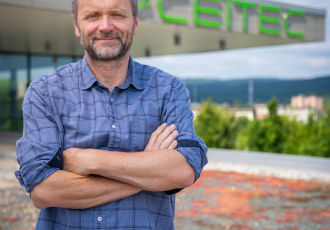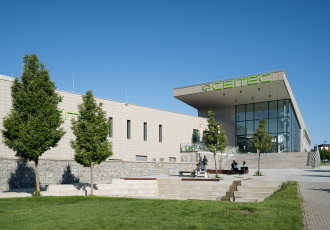27. Nov. 2025
CEITEC BUT is unique in many ways, not only within the Czech Republic, but also throughout the Central European region. The spectroscopy and semiconductor projects that scientists are working on here are so interesting that they attract high-quality students from all over the world. "We are succeeding in building a centre that has a name, excellent scientists, top-notch equipment, cooperates with major technology companies, and generates start-ups that enable research to be put into practice," says Deputy Director Pavel Krečmer.
This academic year is slowly coming to an end, so it's time to take stock. What are you proud of at CEITEC BUT, what have you achieved?
In particular, we have successfully established two new research groups. The first, led by Vinicius Santana, a Brazilian who received the prestigious Junior Star grant from the Czech Science Foundation last year, focuses on quantum technologies, which have great potential for the future, and we naturally do not want to be left behind. The second group, led by Andrea Konečná, deals with advanced applications in the field of electron microscopy. Our existing research groups have also achieved excellent results this year. It would take a long time to name them all. I would also like to highlight the achievements of our PhD school, thanks to which we have a wealth of talent at CEITEC not only from Czechia and Slovakia, but also from 23 other countries around the world, and many important institutions. We are recieving more and more applications from young scientists from technologically advanced countries in the European Union and the US. Last but not least, infrastructure upgrade has been underway for the second year now, and we have managed to secure a large investment that allows us to work on renewing our equipment to meet the requirements of modern research.
How does the CEITEC PhD school differ from regular university PhD programmes and what makes it so attractive to students?
There are quite a few differences, even though some of them are not that significant on their own. For example, our students can apply for their own research project, for which they receive up to €8,000 per year to carry it out. We support around 25 students in this way each year. We are also unique in the extent of our support, organizing student conferences, retreats, and mobility programmes, where students spend 3-6 months outside the Czech Republic working with another partner laboratory. In addition, we evaluate their work through annual reviews and help them find the right direction when they need it. Our school has a range of different hard and soft activities, which together form a comprehensive and at the same time individual approach to each student. And I think that's the biggest difference, because students in traditional PhD programmes at universities don't usually enjoy that kind of support. And as awareness of CEITEC and its strenghths grows, we are attracting better and better students every year. Nowadays, we can truly speak of world-class talent.
You talk about talent and excellent results in research. Does CEITEC focus more on basic or applied research?
It depends on how you look at it; a lot depends on the metrics. In its founding charter, our institute is defined as an interdisciplinary centre with an emphasis on targeted basic research, but of course we also conduct applied research. They say that plans without money are just dreams, so a lot depends on the grants that we receive. Because, whether we like it or not, they are what primarily determine the direction of research today. Moreover, I think that both types of research overlap and that the distinction between them is no longer relevant today. It often happens that what was originally basic research can become cutting-edge applied research within a few days. I would even say, and I could probably back this up with data, that the better the quality of a university's basic research, the better its applied research, especially in the form of start-up companies. Incidentally, we are very successful in establishing these at CEITEC BUT. Since 2011, when our institute was founded, we have already established eight of them, and one of them is even listed on the Prague Stock Exchange. At the same time, we are cooperating with technology companies such as onsemi and Thermo Fisher Scientific, which is based on both primary and, of course, applied research.
The collaboration between CEITEC BUT and onsemi is also possible thanks to cleanroom laboratories where chips can be worked on. What specifically is the subject of research in this area?
Among other things, onsemi is a producer of silicon carbide semiconductors, and a huge advantage of this company is that it can handle the entire production chain itself, from material production to the finished and packaged chip. CEITEC BUT obviously does not have the capacity to attempt to influence the main directions of development, but there are a number of things that can be improved in the materials to suit potential future applications. Our work consists, for example, in trying to understand the material from which the chips are made, looking for new applications for it – such as in advanced sensors – or identifying possible defects that could arise due to age or various environmental influences, and finding ways to eliminate them. We are working together to optimize the technology so that the next generation of chips will be more resistant to higher temperatures, radiation, and the like. Another great advantage of this collaboration is that it allows us to train high-quality experts, many of whom will then find employment at onsemi.
Speaking of semiconductors, onsemi plans to invest another two billion dollars in Czechia. How do you think such a financial injection will affect developments in industry and science?
A number of other companies are already connected to onsemi, so the circle around them as a technology leader will expand to include a number of subcontractors and potentially new start-ups. Personally, I believe that this type of investment will also significantly advance technical universities. A great example of this can be seen at the University of Munich, which is excellent on a global scale, but not on its own. It achieves this high level also because there are a number of top-notch technological OEM companies (companies that manufacture products that are then sold by other companies under their own brands; editorial note) around it, which set the pace and send clear intellectual challenges to the academic environment. Something similar, albeit to a lesser extent, can be expected here in Czechia, i.e. that our universities will succeed in conducting world-class research in the field of semiconductors. We have always been strong in this area and we should once again make the most of this opportunity. At CEITEC BUT, we have succeeded in doing so with Thermo Fisher Scientific, for example. Thanks in part to this company, we have excellent research in the field of electron microscopy, the results of which can also be successful in the commercial sector.
However, success requires cooperation not only between the private sector and academia, but also with the government, which sets priorities. Is CEITEC BUT involved in communication with the relevant ministries?
Yes. Thanks to the semiconductor cluster that was originally established here in Brno, we were able to participate very actively in the debate on semiconductor strategy. Generally speaking, we express ourselves relatively often and extensively, but honestly, Czechia has hundreds of different strategies and the results are often not entirely traceable. I would like to believe that this strategy will be an honorable exception. Moreover, governments come and go, and voters change. And it is possible that after the election (the interview was conducted in June 2025; editorial note), the debates will start again, as the current opposition has already indicated, sometimes in a somewhat unfortunate way. On the other hand, it must be said that many of the measures recommended by the academic community have already been successfully implemented, and Czechia is visibly growing in the field of semiconductor science and industry.
To conclude our conversation, I would like to ask what you would wish for CEITEC in the coming years?
I have been at CEITEC for eight years and I really see a huge shift in its reputation, both internationally and nationally, as well as locally at BUT. It is great that we are succeeding in many respects, that amazing projects are being created on our premises, and that more and more talented people are joining us, significantly influencing our research. The interest of talented people and our ability to attract and retain them are probably our greatest asset, which I would like to see us continue to develop. I wish all of us at CEITEC continued success in this regard and that we continue to increase the prestige of CEITEC and the entire BUT.
Author: Kristina Blűmelová


 Share
Share


